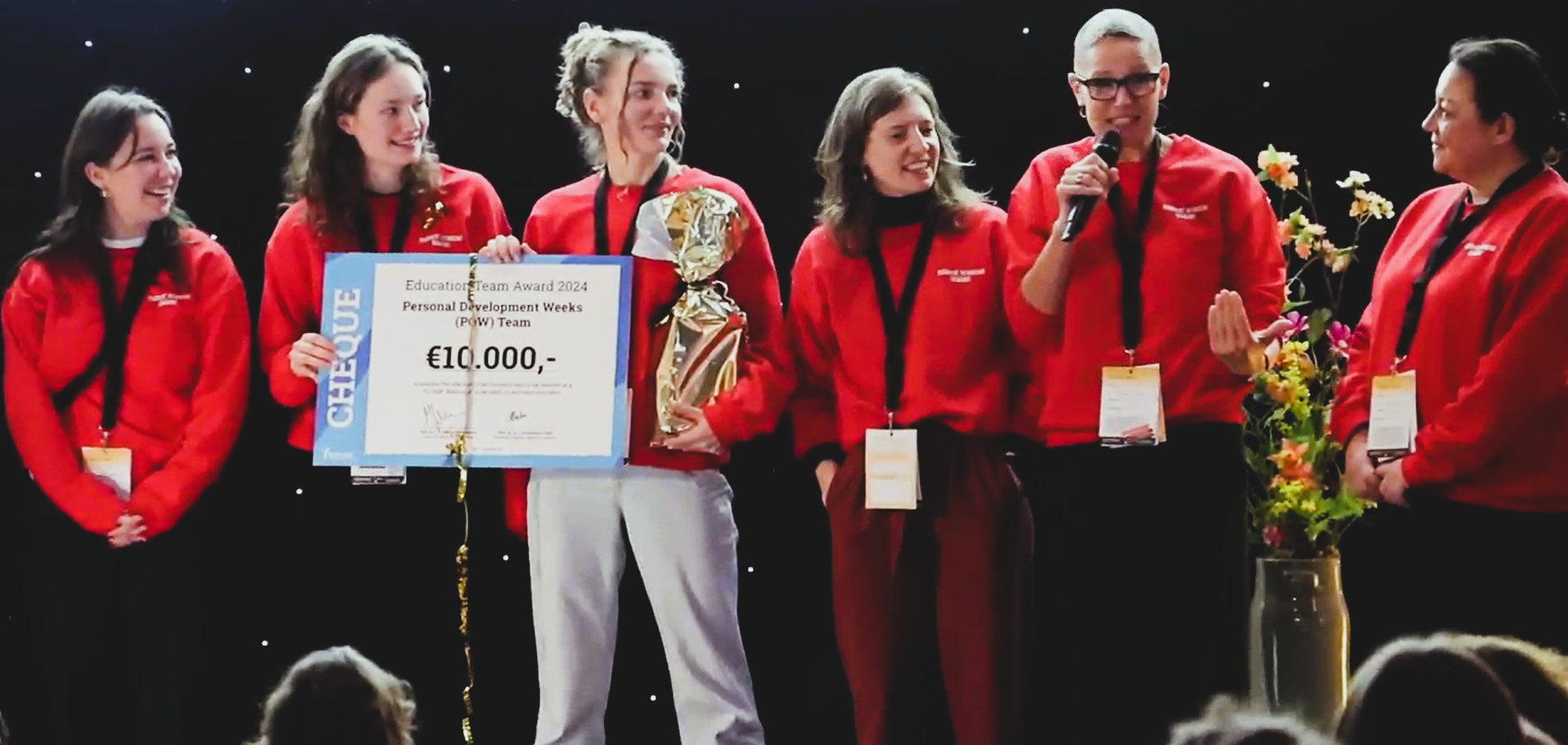TU Delft Education Team of the Year: POW Arch+BE
At TU Delft, we have many wonderful education teams that, each in their own innovative way, collectively contribute to the improvement of the education at our university. Each year, the Directors of Education are asked to nominate an education team that the faculty is proud of. This resulted in four great nominated teams who were all invited for a festive moment in the Teaching Lab celebrating their successes. All nominated education teams were invited to Education Day on November 7. The event featured the award ceremony for the Education Team Award, which grants the winning team €10,000 to invest in educational innovation and strengthen their collaborative efforts.
This year, the POW Team (Personal Development Weeks) proudly holds the title of TU Delft Education Team of the Year 2024!
Congratulations POW Team!
More about all four nominated teams and their practices
The POW Team (Personal Development Weeks) (A+BE)
The main strength of the team is that it is a diverse team of students, supporting staff, researchers and teaching staff with a hands on mentality enthused by the topic and engaged in the setup.
In September 2024, the new Bachelor’s Programme Bouwkunde has started. The complete programme has been renewed to create room for personal and professional reflection. In addition to the five learning trajectory teams, a very innovative contribution to the new schedule was made by the POW team. The Personal Development Weeks are introduced at the end of the first and third quarters when the workload is highest: to give both students and teachers the opportunity to let the teaching sink in, reflect on what they have learnt, take a breather and prepare for the upcoming quarter. These weeks are designed in a way that they are well embedded in the curriculum.
All students received the personal development booklet and wrap with the Board of Questions to reflect on personal and professional development and then a dedicated week is offered for all kinds of activities for them.
Team members: Kristel Aalbers, Milou Reincke, Nina Bohm, Sylvia van Opdorp, Emmylou van Hartrop, Bodil Bary
The MSc Sustainable Energy Technology Education Team (EEMCS)
The goal of the MSc SET team is to deliver and constantly develop inspiring and engaging education in a coherent program. With that providing the students...
with the skills and cutting edge knowledge we develop here at TU Delft; as well as outside skills and knowledge they need to contribute to the energy transition after they have graduated from our program.
With the addition of the heat track, we now have seven out of the 8 faculties of TU Delft contributing to the education in SET. As a result, the main strength of our team is the diversity in background, together with the intrinsic motivation of all colleagues to contribute to the energy transition. By educating the future energy Engineers, we offer inspiring education that is strongly connected across fields.
Team members: René van Swaaij, Martin Bloemendal, Arno Smets, Myrle de Swart, Marike Korterink, Robin Vismara, Alexandros Daniilidis
The Connected Creativity team (IDE)
The Connected Creativity team, launched in 2020, has become a leader in educational innovation at TU Delft, offering a minor that helps students from all disciplines develop creativity skills.
The program features five interconnected courses and innovative teaching practices, fostering a creative learning environment. The team practices the creativity principles they teach, leading to initiatives like a journaling method to boost creativity, the ‘Connect2Create’ European community, and the "Brave Space" where students and educators grow as proactive, experimental learners.
Team members: Barbera Keukens, Bregje van Eekelen, Casper Koomen, Katrina Heijne, Milene Gonçalves, Sam Franklin, Sander Mulder – Teacher, Willemijn Brouwer
MSc education team Aerospace Structures and Materials (AE)
The Aerospace Materials and Structures Master track is undergoing a major revision to improve its core curriculum. The new structure replaces traditional separate classes with 8-week modules consisting of 2-week sprints on various topics.
Teachers work together as a team, integrating assessments throughout the sprints to allow students time to address knowledge gaps and engage in hands-on projects. The curriculum emphasizes student support, sustainability, engineering projects, life cycle analysis, and digital skills. It uses a blended learning approach, combining independent and team-based work, with lecture time focused on solving engineering problems. This approach encourages student autonomy, teamwork, and professional collaboration, while aligning with TU Delft’s teaching vision to foster growth in both students and teachers.
Team members: Daniel Peeters, Ines Uriol Balbin, Reza Sabzevari, Roger Groves, Yinglu Tang, Prem Sundaramoorthy, John-Alan Pascoe, Calvin Rans
